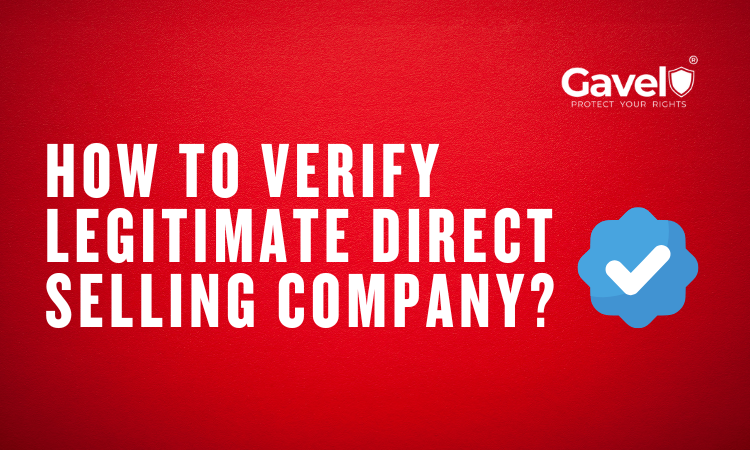In today’s world, where flexible income opportunities and entrepreneurial ventures are on the rise, direct selling MLM has gained significant popularity. From wellness products to fashion, beauty, and home care items, many individuals are drawn to the idea of selling products directly to consumers through Network of Direct Sellers—often with the added benefit of building a network and earning commissions. But with this rise comes an important question: Can consumers or Direct Seller verify the legitimacy of a direct selling MLM company before getting involved? The answer is yes—and it’s more important than ever to do so.
Read Also – Misleading Advertisements and Penalties in Direct Selling?
Why Verification Matters
While direct selling MLM is a legal and regulated business model in India, not all Direct Selling MLM companies operate with transparency and integrity as per Direct Selling Rules 2021. Over the years, there have been numerous reports of consumers and Direct Sellers falling prey to fraudulent schemes masquerading as direct selling MLM businesses. These schemes often promise high returns with little effort and rely heavily on recruitment rather than product or service sales—a key sign of a pyramid scheme. This is where consumer or Direct Seller awareness becomes crucial. By taking a few proactive steps, consumers and Direct Sellers can protect themselves from scams and ensure they are associating with genuine Direct Selling MLM companies that follow ethical business practices.
Read also – Grievance Redressal Mechanism in Direct Selling?
Understanding the Direct Selling MLM Legal Framework in India
The Indian government has taken strong steps to regulate the direct selling MLM industry. In December 2021, the Ministry of Consumer Affairs notified the Consumer Protection (Direct Selling) Rules, 2021, which set clear legal standards for direct selling mlm companies operating in this sector.
As per these rules, every direct selling mlm company must:
- Be registered in India and have a physical office in the country.
- Submit compliance declarations and maintain transparency in operations.
- Avoid pyramid and money circulation schemes.
- Have a proper grievance redressal mechanism to handle consumer complaints.
- Provide accurate and fair income representations without making misleading promises.
- Offer refund and return policies for products sold.
- Display clear contact details, terms, and conditions on their website.
These rules empower consumers to make informed choices and hold companies accountable for their actions.
How Consumers or Direct Sellers Can Verify Legitimacy of Direct Selling MLM Companies
Here are some practical steps a consumer can take to verify whether a direct selling company is legitimate:
1. Check Registration and Legal Status
Visit the official website of the Direct Selling MLM company and verify if it mentions compliance with the Direct Selling Rules, 2021.
2. Review the Direct Selling MLM Business Model
A legitimate direct selling MLM company focuses on product or service sales, not just recruitment. Be cautious if the primary way to earn money is by enrolling new members, especially if there are high joining fees or no real product value.
3. Look for a Grievance Redressal System
Check whether the company has a dedicated customer care system or grievance officer. Under the rules, this is mandatory. A company without such a system may not be operating legally.
4. Evaluate the Website Transparency
According to the Direct Selling Rules, Direct Selling MLM companies must display essential information such as:
- Product descriptions and pricing
- Return/refund policies
- Terms and conditions
- Privacy policy
- Contact information
- Grievance redressal details
If this information is missing or vague, it’s a red flag.
5. Check for Direct Selling State Compliance
Some Indian states, like Andhra Pradesh, Tamil Nadu, and Kerala, have issued additional guidelines or orders requiring local registration or monitoring. Check whether the direct selling mlm company complies with such state-level requirements, especially if you’re based in those regions.
6. Seek Out Reviews and Independent Opinions
Look for reviews or discussions on independent consumer forums or social media groups. While not all reviews are accurate, consistent complaints about lack of support, non-payment, or legal trouble can indicate deeper issues.
7. Beware of Red Flags
Watch out for:
- Pressure to invest large sums of money upfront.
- Promises of “guaranteed” income.
- Lack of written agreements or policies.
Vague or constantly changing compensation structures.
Empowering Consumers Through Awareness
The biggest defense against fraud is awareness. As consumers, we have the right—and responsibility—to ask questions, research companies thoroughly, and make informed decisions. The Direct Selling Rules, 2021 have given us a legal framework to rely on, but the first line of protection is always individual vigilance.
Legitimate direct selling companies provide real value through quality products and fair business opportunities. By learning to spot the differences, consumers can enjoy the benefits of this industry without falling into traps.
Final Thoughts The direct selling industry in India has immense potential, but like any industry, it requires ethical practices and strong consumer safeguards. Verifying a company’s legitimacy is not just possible—it’s essential. With the right information and a careful approach, consumers can confidently participate in direct selling, knowing they’re backed by legal protections and informed choices.
Gavel Direct Selling Consultant is your trusted legal partner in navigating the complexities of India’s direct selling industry. From regulatory compliance and business structuring to advertising guidance and dispute resolution, we offer expert legal solutions tailored to direct selling entities and individuals. With in-depth knowledge of the Consumer Protection (Direct Selling) Rules, 2021, we help ensure your business stays ethical, compliant, and future-ready.

